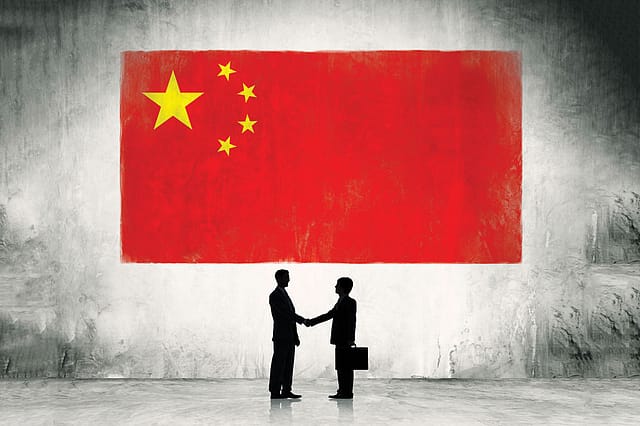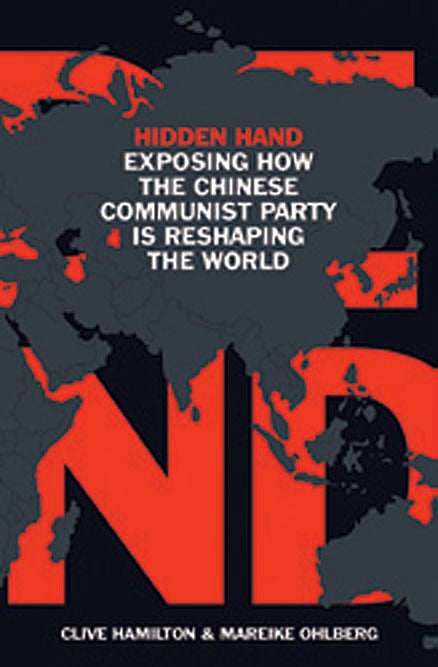Unmade by China

THE CHINESE COMMUNIST Party is determined to transform the international order, to shape the world in its own image, without a shot being fired. Rather than challenging from the outside, it has been eroding resistance to it from within, by winning supporters, silencing critics and subverting institutions.
Whereas analysts on both sides of the Atlantic continue to agonise over whether to label China an opponent or even an enemy, the CCP decided this matter thirty years ago. In the post-Soviet world, it saw itself surrounded by enemies that it needed to defeat or neutralise. While the CCP and its supporters in the West like to speak of a ‘new Cold War’ being waged against China, the Party itself has all along been engaged in an ideological struggle against ‘hostile forces’. For the CCP, the Cold War never ended.
The reshaping of alliances and the remoulding of the way the world thinks about it are essential to the Party securing continued rule at home, as well as to its reach and eventually making China the number one global power. The Party’s plans have been explained at length in speeches and documents. Its implementation strategy is to target elites in the West so that they either welcome China’s dominance or accede to its inevitability, rendering resistance futile. In some nations, mobilising the wealth and political influence of the Chinese diaspora, while at the same time silencing critics within it, is central to the strategy.
Imran Khan: Pakistan’s Prisoner
27 Feb 2026 - Vol 04 | Issue 60
The descent and despair of Imran Khan
Backed by its enormous economic clout, China engages in arm-twisting, diplomatic pressure, united front and ‘friendship’ work, and the manipulation of media, think tanks and universities—all these tactics overlap and reinforce each another. Some people claim that Beijing’s influence around the word is no different to that of any other country. While not everything the Party does in this respect is unique, the scope, degree of organisation, and eagerness to use coercion distinguish the CCP’s actions from other nations’ diplomatic activities.
As the world’s largest factory and second-biggest economy, China has been a magnet for Western businesses and many Western politicians. Some industries are heavily dependent on access to China’s huge market, and Beijing is willing to use this dependence as a political weapon. In the words of one close observer, ‘If you don’t do what Beijing’s political leaders want they will punish you economically. They put the economic vice on politicians around the world. They have been doing it for years and it works.’
At times, the vice has been tightened in conspicuous ways. After the arrest of Huawei executive Meng Wanzhou in Canada in 2018, for example, imports of Canadian soybeans, canola and pork were blocked. Beijing reacted in a similar way in 2017 when South Korea, in response to aggression from the North, began installing an American antiballistic missile system. Beijing took forty-three retaliatory measures, including banning Chinese tourist groups to South Korea, driving a large Korean conglomerate out of China, barring K-pop stars, and blocking imports of electronics and cosmetics. Beijing was still punishing South Koreans in October 2019 when it demanded that the prestigious Eastman School of Music at the University of Rochester, in New York State, exclude three Korean students from its top orchestra if it wanted a planned tour of China to go ahead. Citing the damage to Eastman’s reputation in China if the tour were to be cancelled, the dean agreed to leave the Koreans behind. Only after an outcry by students and alumni did the school decide to cancel the tour.
When Daryl Morey, general manager of the Houston Rockets basketball team, tweeted his support for Hong Kong protesters in late 2019, Beijing’s backlash was instantaneous. (The torrent of criticism on Twitter appears to have come from trolls and fake accounts in China.) The televising of Rockets games to its huge fan base in China was suspended. Sponsors withdrew. Beijing raged that Morey had ‘hurt the feelings of the Chinese people’. The state broadcaster, China Central Television, redefined freedom of speech to exclude ‘challenging national sovereignty and social stability’. Desperate to protect its growing market in China, the US National Basketball Association issued a fawning apology that read as if written by the CCP’s Central Propaganda Department.
While only a few examples of extreme punishment are needed in order to sow fear in everyone, Beijing prefers to keep its threats vague and thus deniable, to keep the targets guessing. As Perry Link puts it, vagueness frightens more people because no-one can rule themselves out, and those in the frame therefore ‘curtail a wider range of activity’. Beijing has become the world’s master practitioner of the dark arts of economic statecraft, in part because in recent decades Western nations’ commitment to free-market policies makes them reluctant to manipulate trade for political reasons. That’s why the world was shocked when Donald Trump launched a trade war against China in 2018. While he is wrong on many other things, Trump is right that Beijing has been systematically violating the principles of international economic engagement and getting away with it.
Beijing’s vast program of infrastructure investment abroad, known as the Belt and Road Initiative, is the ultimate instrument of economic statecraft or, more accurately, economic blackmail. It provides an outlet for China’s construction industry and enormous capital reserves, while at the same time supplying the investment needs of other countries who are short of capital and excluded from mainstream sources of finance. The offer of low-interest loans is hard to resist, especially when they come without environmental or other conditions.
However, the objectives of the BRI, also known as the New Silk Road, go well beyond providing an outlet for surplus Chinese capital or helping poorer nations develop; the initiative is Beijing’s primary mechanism for reordering the global geopolitical system. Xi Jinping’s signature policy is now so closely integrated with almost all Chinese government activity abroad—commercial, technological, academic, cultural—that it cannot be separated from the PRC’s overall diplomatic engagement.
Xi Jinping has repeatedly referred to the BRI as essential to his vision of constructing ‘a community of common destiny for humankind’. While the idea might sound good to Western ears, its aim is a Sinocentric world; that is, the one envisaged by the hawks elevated by Xi to the top leadership positions. They view a China-led world order as an essential part of the ‘great rejuvenation of the Chinese people’.
So the BRI is the most powerful vehicle by which Beijing is changing the postwar international order. In a revealing 2015 speech, defence strategist and retired PLA major-general Qiao Liang described the BRI purely as the vehicle for China to achieve dominance over the United States. It represents, he stated, China’s new and irresistible form of globalisation, the success of which will be measured by the renminbi displacing the dollar as the world currency, leaving the United States ‘hollowed out’. While Qiao is a pusher of boundaries, the geostrategic rationale of the BRI is also made plain elsewhere, such as the leaked minutes of a 2019 Chinese-Malaysian meeting on a BRI project, which noted that despite the project’s ‘political nature’, the public had to see it as market-driven.
The adjective most frequently attached to the BRI is ‘vast’, and when China’s top diplomat, Yang Jiechi, said in April 2019 that the BRI ‘does not play little geopolitical games’, he was speaking the truth. The former editor of the Far Eastern Economic Review, Nayan Chanda, describes the BRI as ‘an overt expression of China’s power ambitions in the 21st century’.
Like other so-called parallel institutions created by the Chinese government, such as the Asian Infrastructure Investment Bank, the BRI pretends to pose no challenge to countries’ existing institutions, while incrementally realigning their interests and shifting the global balance of power. A key part of the CCP’s thinking on global and regional power dynamics is the identification of a ‘main contradiction’ and a ‘main enemy’ to unite against. On a global scale, that enemy is the United States, which needs to be split from its allies and isolated.
Brexit, dissension in the European Union and the election of Donald Trump have created a strategic opportunity for Beijing to weaken the transatlantic alliance and further erode European unity. Long seen by the CCP as the largely irrelevant junior partner of the United States, Europe is now viewed as the great prize. By winning over Europe, the CCP hopes to convince the world that China is the ‘champion of multilateralism’ and a much-needed counterweight to US hegemony and unilateralism. Beijing wants to mobilise European support for its initiatives in the developing world.
Despite all the news stories about ‘debt diplomacy’, ‘global connectivity’ and ‘win-win cooperation’, it’s apparent that the BRI’s goal of strategic rebalancing is to be achieved not only by the political clout that goes with infrastructure investment, but also by a subtle and multi-pronged program of global thought management. The BRI is about the projection of power through controlling the terms of the debate. It no longer makes sense to confine discussion of the BRI to business and economics, because it sprouts everywhere, from the Silk Road network of think tanks, media agreements, and ties between cultural institutions, to the establishment of sister cities and ‘people-to-people exchanges’, all of which are incorporated into BRI memoranda of understanding.
Today, the CCP remains deeply anxious about ‘ideological infiltration’ by hostile forces bent on regime change in China. As a manual published by the Central Propaganda Department in 2006 explained, ‘when hostile forces want to bring disarray to a society and overthrow a political regime, they always start by opening a hole to creep through in the ideological field and by confusing people’s thought’. This Cold War mentality is vital to an understanding of the CCP’s international activities, which are first and foremost the global extension of the Party’s desire for regime security.
(This is an edited excerpt from Hidden Hand: Exposing How the Chinese Communist Party Is Reshaping the World by Clive Hamilton and Mareike Ohlberg HarperCollins India; 432 pages; Rs 599)

